Click here for the photo report
The three day programme started of with a series of business round table meetings that gave an opportunity to meet with Chinese retailers and importers. Prominent buyers were present, including Fruitday, Frutacloud, China Resources Vanguard, Mr Fresh (part of the Alibaba Group) and Walmart China. The programme for the next day contained a series of lectures on the global and Chinese fresh produce industry and affiliated branches. The conference on Thursday was open to a local Chinese audience, and was well attended by a mixture of Chinese trade companies, importers, logistics providers, retailers and e-commerce businesses. Among international attendees and speakers were Camposol, Giumarra Vineyards, SVA Fruits (China), Summerfruit Australia and Emerson. On Friday, a full-day industry tour was organised to different online and offline retailers in Shanghai.

Fruitday’s purchasing team at the business round table meetings
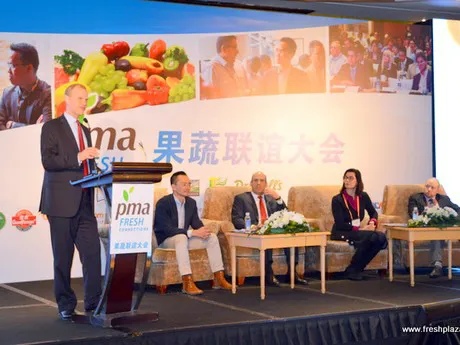
Richard Owen of the PMA welcomes the audience at the start of PMA Fresh Connections: China
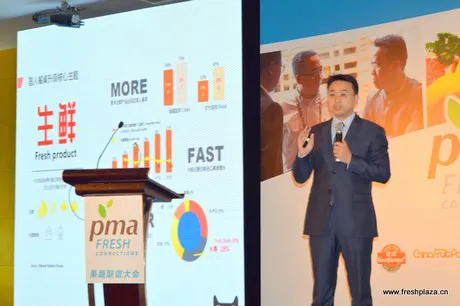
Online sales of fresh produce in China is rapidly growing. He Chun Lei is the CEO of Tmall Fresh, part of the Alibaba Group. He explains how powerful a tool data gathering of online sales can be in understanding the consumer and tailoring to meet their demand.
Click here for the photo report
China’s retail market seems to be thriving. Local brick and mortar stores are heavily competing with online shops on price and convenience in China’s large, affluent cities. Both are pushing to be as close to the end consumer as possible: supermarket chains are opening new neighbourhood shops on every block in Shanghai, and online retailer promise everything from 24 hour to half an hour home deliveries. Online giants, such as Alibaba, are moving into brick and mortar stores to give the customer the opportunity to experience the product. Offline players are moving online to provide their clients with more convenience, flexibility and to be able to collect valuable customer data. No clearly winning format has yet emerged and competition is fierce.
The industry tour started with a presentation at one of the distribution centres of Exfresh, a leading cold chain service provider in China and a subsidiary of Yiguo. The company received a strategic investment from Alibaba in 2013 and is now responsible for the cold chain, warehousing, packing, logistics operations and home delivery of Alibaba’s Tmall Fresh, as well as the Suning Commerce Group, the 3th largest online retailer in China, and the Lianhua Supermarket chain. Its growth ambitions are staggering. According to Eric Li, Vice President of Exfresh: “We want to revolutionise the ‘farm to table’ concept. We have opened 11 regional distribution centres across across China that connect to local distribution hubs, of which Shanghai has 30. As such we can deliver all products within 24 hours after ordering online. Our aim is to triple our revenue year on year”, according to Exfresh’s marketing manager. “Online sales of fresh produce are growing because we can offer the client the product at a more competitive price with more convenience and more variety. By collecting customer data we can push and promote products per person, based on their preferences.”

Eric Li, Vice President of Yiguo, mother company of Exfresh
Click here for the photo report
The tour continued with a visit to Hema, a new premium retailer in Shanghai which opened its doors last year. Hema is 100% owned by Alibaba, and embodies the internet giant’s new retail model, in which the company is moving into brick and mortar sales. Hema is also pushing for rapid expansion, according to Paul, the Marketing Manager: “Hema opened fifteen stores last year. As opposed to traditional stores, we focus on achieving half of our sales online and half of our sales offline. We pledge to deliver all orders within 30 minutes. At weekends, customers visit our stores to experience our products and to try out new flavours and brands. We have in-store restaurants and bars, where chefs can directly prepare the fresh products that our customers have bought.”
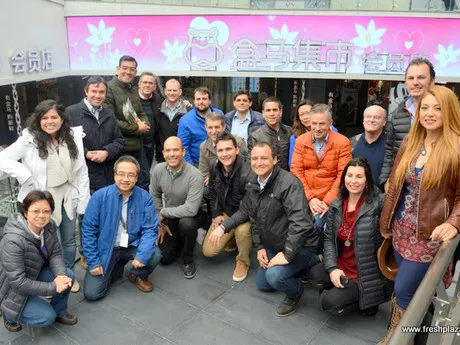
Group photo in front of the Hema Shanghai store
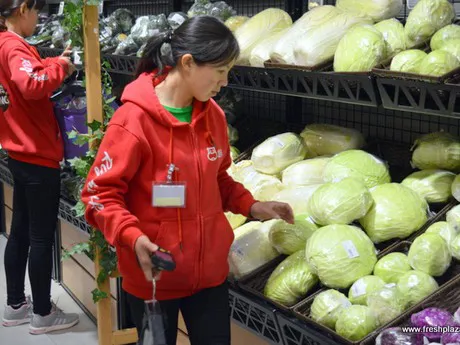
Staff at Hema, Shanghai, are collecting orders for online clients. After placing an order online, each clients within a certain area around a Hema store should receive the purchase within 30 minutes, delivered to their door
In the afternoon, the group paid a short visit to an outlet of Yonghui Superstores and Pagoda. The chain originates from Fuzhou in Southeastern China. The group operates hypermarkets and over 500 smaller stores across China. Its next strategic plan is to enter the neighbourhoods to be as close to the customer as possible. Mr Lu, the store manager, explains: “We launched the neighbourhood model in 2014. We aim to have a small shop on every block in larger cities. Around these shops we also provide home delivery. We hope to open 200 stores by the end of this year.”
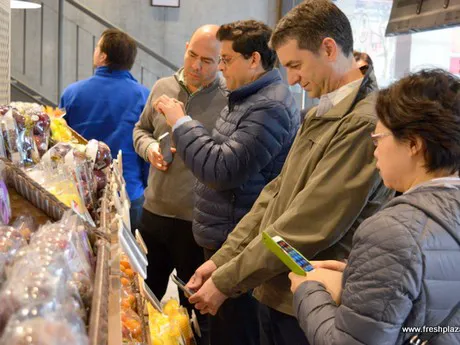
A visit to one of Yong Hui’s neighbourhood stores in Shanghai
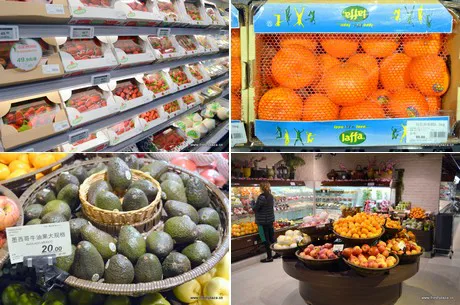
Click here for the photo report
